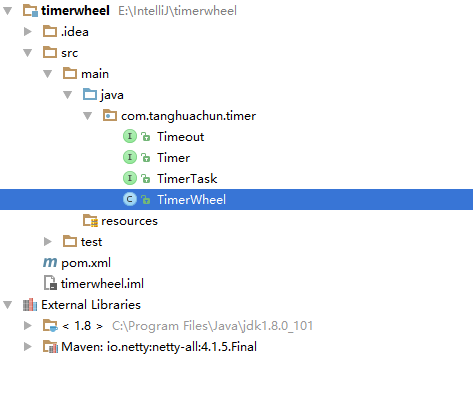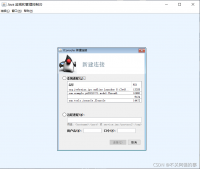考虑这样一个场景,现在有5000个任务,要让这5000个任务每隔5分中触发某个操作,怎么去实现这个需求。大部分人首先想到的是使用定时器,但是5000个任务,你就要用5000个定时器,一个定时器就是一个线程,你懂了吧,这种方法肯定是不行的。
针对这个场景,催生了时间轮算法,时间轮到底是什么?我一贯的风格,自行谷歌去。大发慈悲,发个时间轮介绍你们看看,看文字和图就好了,代码不要看了,那个文章里的代码运行不起来,时间轮介绍。
看好了介绍,我们就开始动手吧。
开发环境:idea + jdk1.8 + maven
新建一个maven工程

创建如下的目录结构

不要忘了pom.xml中添加netty库
|
1
2
3
4
5
6
7
|
<dependencies> <dependency> <groupid>io.netty</groupid> <artifactid>netty-all</artifactid> <version>4.1.5.final</version> </dependency> </dependencies> |
代码如下
timeout.java
|
1
2
3
4
5
6
7
8
|
package com.tanghuachun.timer;public interface timeout { timer timer(); timertask task(); boolean isexpired(); boolean iscancelled(); boolean cancel();} |
timer.java
|
1
2
3
4
5
6
7
8
|
package com.tanghuachun.timer;import java.util.set;import java.util.concurrent.timeunit;public interface timer { timeout newtimeout(timertask task, long delay, timeunit unit, string argv); set<timeout> stop();} |
timertask.java
|
1
2
3
4
|
package com.tanghuachun.timer;public interface timertask { void run(timeout timeout, string argv) throws exception;} |
timerwheel.java
|
1
2
3
4
5
6
7
8
9
10
11
12
13
14
15
16
17
18
19
20
21
22
23
24
25
26
27
28
29
30
31
32
33
34
35
36
37
38
39
40
41
42
43
44
45
46
47
48
49
50
51
52
53
54
55
56
57
58
59
60
61
62
63
64
65
66
67
68
69
70
71
72
73
74
75
76
77
78
79
80
81
82
83
84
85
86
87
88
89
90
91
92
93
94
95
96
97
98
99
100
101
102
103
104
105
106
107
108
109
110
111
112
113
114
115
116
117
118
119
120
121
122
123
124
125
126
127
128
129
130
131
132
133
134
135
136
137
138
139
140
141
142
143
144
145
146
147
148
149
150
151
152
153
154
155
156
157
158
159
160
161
162
163
164
165
166
167
168
169
170
171
172
173
174
175
176
177
178
179
180
181
182
183
184
185
186
187
188
189
190
191
192
193
194
195
196
197
198
199
200
201
202
203
204
205
206
207
208
209
210
211
212
213
214
215
216
217
218
219
220
221
222
223
224
225
226
227
228
229
230
231
232
233
234
235
236
237
238
239
240
241
242
243
244
245
246
247
248
249
250
251
252
253
254
255
256
257
258
259
260
261
262
263
264
265
266
267
268
269
270
271
272
273
274
275
276
277
278
279
280
281
282
283
284
285
286
287
288
289
290
291
292
293
294
295
296
297
298
299
300
301
302
303
304
305
306
307
308
309
310
311
312
313
314
315
316
317
318
319
320
321
322
323
324
325
326
327
328
329
330
331
332
333
334
335
336
337
338
339
340
341
342
343
344
345
346
347
348
349
350
351
352
353
354
355
356
357
358
359
360
361
362
363
364
365
366
367
368
369
370
371
372
373
374
375
376
377
378
379
380
381
382
383
384
385
386
387
388
389
390
391
392
393
394
395
396
397
398
399
400
401
402
403
404
405
406
407
408
409
410
411
412
413
414
415
416
417
418
419
420
421
422
423
424
425
426
427
428
429
430
431
432
433
434
435
436
437
438
439
440
441
442
443
444
445
446
447
448
449
450
451
452
453
454
455
456
457
458
459
460
461
462
463
464
465
466
467
468
469
470
471
472
473
474
475
476
477
478
479
480
481
482
483
484
485
486
487
488
489
490
491
492
493
494
495
496
497
498
499
500
501
502
503
504
505
506
507
508
509
510
511
512
513
514
515
516
517
518
519
520
521
522
523
524
525
526
527
528
529
530
531
532
533
534
535
536
537
538
539
540
541
542
543
544
545
546
547
548
549
550
551
552
553
554
555
556
557
558
559
560
561
562
563
564
565
566
567
568
569
570
571
572
573
574
575
576
577
578
579
580
581
582
583
584
585
586
587
588
589
590
591
592
593
594
595
596
597
598
599
600
601
602
603
604
605
606
607
608
609
610
611
612
613
614
615
616
617
618
619
620
621
622
623
624
625
626
627
628
629
630
631
632
633
634
635
636
637
638
639
640
641
642
643
644
645
646
647
648
649
650
651
652
653
654
655
656
657
658
659
660
661
662
663
664
665
666
667
668
669
670
671
672
673
674
675
676
677
678
679
680
681
682
683
684
685
686
687
688
689
690
691
692
693
694
695
696
697
698
699
700
701
702
703
704
705
706
707
708
|
/* * copyright 2012 the netty project * * the netty project licenses this file to you under the apache license, * version 2.0 (the "license"); you may not use this file except in compliance * with the license. you may obtain a copy of the license at: * * http://www.apache.org/licenses/license-2.0 * * unless required by applicable law or agreed to in writing, software * distributed under the license is distributed on an "as is" basis, without * warranties or conditions of any kind, either express or implied. see the * license for the specific language governing permissions and limitations * under the license. */package com.tanghuachun.timer;import io.netty.util.*;import io.netty.util.internal.platformdependent;import io.netty.util.internal.stringutil;import io.netty.util.internal.logging.internallogger;import io.netty.util.internal.logging.internalloggerfactory;import java.util.collections;import java.util.hashset;import java.util.queue;import java.util.set;import java.util.concurrent.countdownlatch;import java.util.concurrent.executors;import java.util.concurrent.threadfactory;import java.util.concurrent.timeunit;import java.util.concurrent.atomic.atomicintegerfieldupdater;public class timerwheel implements timer { static final internallogger logger = internalloggerfactory.getinstance(timerwheel.class); private static final resourceleakdetector<timerwheel> leakdetector = resourceleakdetectorfactory.instance() .newresourceleakdetector(timerwheel.class, 1, runtime.getruntime().availableprocessors() * 4l); private static final atomicintegerfieldupdater<timerwheel> worker_state_updater; static { atomicintegerfieldupdater<timerwheel> workerstateupdater = platformdependent.newatomicintegerfieldupdater(timerwheel.class, "workerstate"); if (workerstateupdater == null) { workerstateupdater = atomicintegerfieldupdater.newupdater(timerwheel.class, "workerstate"); } worker_state_updater = workerstateupdater; } private final resourceleak leak; private final worker worker = new worker(); private final thread workerthread; public static final int worker_state_init = 0; public static final int worker_state_started = 1; public static final int worker_state_shutdown = 2; @suppresswarnings({ "unused", "fieldmaybefinal", "redundantfieldinitialization" }) private volatile int workerstate = worker_state_init; // 0 - init, 1 - started, 2 - shut down private final long tickduration; private final hashedwheelbucket[] wheel; private final int mask; private final countdownlatch starttimeinitialized = new countdownlatch(1); private final queue<hashedwheeltimeout> timeouts = platformdependent.newmpscqueue(); private final queue<hashedwheeltimeout> cancelledtimeouts = platformdependent.newmpscqueue(); private volatile long starttime; /** * creates a new timer with the default thread factory * ({@link executors#defaultthreadfactory()}), default tick duration, and * default number of ticks per wheel. */ public timerwheel() { this(executors.defaultthreadfactory()); } /** * creates a new timer with the default thread factory * ({@link executors#defaultthreadfactory()}) and default number of ticks * per wheel. * * @param tickduration the duration between tick * @param unit the time unit of the {@code tickduration} * @throws nullpointerexception if {@code unit} is {@code null} * @throws illegalargumentexception if {@code tickduration} is <= 0 */ public timerwheel(long tickduration, timeunit unit) { this(executors.defaultthreadfactory(), tickduration, unit); } /** * creates a new timer with the default thread factory * ({@link executors#defaultthreadfactory()}). * * @param tickduration the duration between tick * @param unit the time unit of the {@code tickduration} * @param ticksperwheel the size of the wheel * @throws nullpointerexception if {@code unit} is {@code null} * @throws illegalargumentexception if either of {@code tickduration} and {@code ticksperwheel} is <= 0 */ public timerwheel(long tickduration, timeunit unit, int ticksperwheel) { this(executors.defaultthreadfactory(), tickduration, unit, ticksperwheel); } /** * creates a new timer with the default tick duration and default number of * ticks per wheel. * * @param threadfactory a {@link threadfactory} that creates a * background {@link thread} which is dedicated to * {@link timertask} execution. * @throws nullpointerexception if {@code threadfactory} is {@code null} */ public timerwheel(threadfactory threadfactory) { this(threadfactory, 100, timeunit.milliseconds); } /** * creates a new timer with the default number of ticks per wheel. * * @param threadfactory a {@link threadfactory} that creates a * background {@link thread} which is dedicated to * {@link timertask} execution. * @param tickduration the duration between tick * @param unit the time unit of the {@code tickduration} * @throws nullpointerexception if either of {@code threadfactory} and {@code unit} is {@code null} * @throws illegalargumentexception if {@code tickduration} is <= 0 */ public timerwheel( threadfactory threadfactory, long tickduration, timeunit unit) { this(threadfactory, tickduration, unit, 512); } /** * creates a new timer. * * @param threadfactory a {@link threadfactory} that creates a * background {@link thread} which is dedicated to * {@link timertask} execution. * @param tickduration the duration between tick * @param unit the time unit of the {@code tickduration} * @param ticksperwheel the size of the wheel * @throws nullpointerexception if either of {@code threadfactory} and {@code unit} is {@code null} * @throws illegalargumentexception if either of {@code tickduration} and {@code ticksperwheel} is <= 0 */ public timerwheel( threadfactory threadfactory, long tickduration, timeunit unit, int ticksperwheel) { this(threadfactory, tickduration, unit, ticksperwheel, true); } /** * creates a new timer. * * @param threadfactory a {@link threadfactory} that creates a * background {@link thread} which is dedicated to * {@link timertask} execution. * @param tickduration the duration between tick * @param unit the time unit of the {@code tickduration} * @param ticksperwheel the size of the wheel * @param leakdetection {@code true} if leak detection should be enabled always, if false it will only be enabled * if the worker thread is not a daemon thread. * @throws nullpointerexception if either of {@code threadfactory} and {@code unit} is {@code null} * @throws illegalargumentexception if either of {@code tickduration} and {@code ticksperwheel} is <= 0 */ public timerwheel( threadfactory threadfactory, long tickduration, timeunit unit, int ticksperwheel, boolean leakdetection) { if (threadfactory == null) { throw new nullpointerexception("threadfactory"); } if (unit == null) { throw new nullpointerexception("unit"); } if (tickduration <= 0) { throw new illegalargumentexception("tickduration must be greater than 0: " + tickduration); } if (ticksperwheel <= 0) { throw new illegalargumentexception("ticksperwheel must be greater than 0: " + ticksperwheel); } // normalize ticksperwheel to power of two and initialize the wheel. wheel = createwheel(ticksperwheel); mask = wheel.length - 1; // convert tickduration to nanos. this.tickduration = unit.tonanos(tickduration); // prevent overflow. if (this.tickduration >= long.max_value / wheel.length) { throw new illegalargumentexception(string.format( "tickduration: %d (expected: 0 < tickduration in nanos < %d", tickduration, long.max_value / wheel.length)); } workerthread = threadfactory.newthread(worker); leak = leakdetection || !workerthread.isdaemon() ? leakdetector.open(this) : null; } private static hashedwheelbucket[] createwheel(int ticksperwheel) { if (ticksperwheel <= 0) { throw new illegalargumentexception( "ticksperwheel must be greater than 0: " + ticksperwheel); } if (ticksperwheel > 1073741824) { throw new illegalargumentexception( "ticksperwheel may not be greater than 2^30: " + ticksperwheel); } ticksperwheel = normalizeticksperwheel(ticksperwheel); hashedwheelbucket[] wheel = new hashedwheelbucket[ticksperwheel]; for (int i = 0; i < wheel.length; i ++) { wheel[i] = new hashedwheelbucket(); } return wheel; } private static int normalizeticksperwheel(int ticksperwheel) { int normalizedticksperwheel = 1; while (normalizedticksperwheel < ticksperwheel) { normalizedticksperwheel <<= 1; } return normalizedticksperwheel; } /** * starts the background thread explicitly. the background thread will * start automatically on demand even if you did not call this method. * * @throws illegalstateexception if this timer has been * {@linkplain #stop() stopped} already */ public void start() { switch (worker_state_updater.get(this)) { case worker_state_init: if (worker_state_updater.compareandset(this, worker_state_init, worker_state_started)) { workerthread.start(); } break; case worker_state_started: break; case worker_state_shutdown: throw new illegalstateexception("cannot be started once stopped"); default: throw new error("invalid workerstate"); } // wait until the starttime is initialized by the worker. while (starttime == 0) { try { starttimeinitialized.await(); } catch (interruptedexception ignore) { // ignore - it will be ready very soon. } } } @override public set<timeout> stop() { if (thread.currentthread() == workerthread) { throw new illegalstateexception( timerwheel.class.getsimplename() + ".stop() cannot be called from " + timertask.class.getsimplename()); } if (!worker_state_updater.compareandset(this, worker_state_started, worker_state_shutdown)) { // workerstate can be 0 or 2 at this moment - let it always be 2. worker_state_updater.set(this, worker_state_shutdown); if (leak != null) { leak.close(); } return collections.emptyset(); } boolean interrupted = false; while (workerthread.isalive()) { workerthread.interrupt(); try { workerthread.join(100); } catch (interruptedexception ignored) { interrupted = true; } } if (interrupted) { thread.currentthread().interrupt(); } if (leak != null) { leak.close(); } return worker.unprocessedtimeouts(); } @override public timeout newtimeout(timertask task, long delay, timeunit unit, string argv) { if (task == null) { throw new nullpointerexception("task"); } if (unit == null) { throw new nullpointerexception("unit"); } start(); // add the timeout to the timeout queue which will be processed on the next tick. // during processing all the queued hashedwheeltimeouts will be added to the correct hashedwheelbucket. long deadline = system.nanotime() + unit.tonanos(delay) - starttime; hashedwheeltimeout timeout = new hashedwheeltimeout(this, task, deadline, argv); timeouts.add(timeout); return timeout; } private final class worker implements runnable { private final set<timeout> unprocessedtimeouts = new hashset<timeout>(); private long tick; @override public void run() { // initialize the starttime. starttime = system.nanotime(); if (starttime == 0) { // we use 0 as an indicator for the uninitialized value here, so make sure it's not 0 when initialized. starttime = 1; } // notify the other threads waiting for the initialization at start(). starttimeinitialized.countdown(); do { final long deadline = waitfornexttick(); if (deadline > 0) { int idx = (int) (tick & mask); processcancelledtasks(); hashedwheelbucket bucket = wheel[idx]; transfertimeoutstobuckets(); bucket.expiretimeouts(deadline); tick++; } } while (worker_state_updater.get(timerwheel.this) == worker_state_started); // fill the unprocessedtimeouts so we can return them from stop() method. for (hashedwheelbucket bucket: wheel) { bucket.cleartimeouts(unprocessedtimeouts); } for (;;) { hashedwheeltimeout timeout = timeouts.poll(); if (timeout == null) { break; } if (!timeout.iscancelled()) { unprocessedtimeouts.add(timeout); } } processcancelledtasks(); } private void transfertimeoutstobuckets() { // transfer only max. 100000 timeouts per tick to prevent a thread to stale the workerthread when it just // adds new timeouts in a loop. for (int i = 0; i < 100000; i++) { hashedwheeltimeout timeout = timeouts.poll(); if (timeout == null) { // all processed break; } if (timeout.state() == hashedwheeltimeout.st_cancelled) { // was cancelled in the meantime. continue; } long calculated = timeout.deadline / tickduration; timeout.remainingrounds = (calculated - tick) / wheel.length; final long ticks = math.max(calculated, tick); // ensure we don't schedule for past. int stopindex = (int) (ticks & mask); hashedwheelbucket bucket = wheel[stopindex]; bucket.addtimeout(timeout); } } private void processcancelledtasks() { for (;;) { hashedwheeltimeout timeout = cancelledtimeouts.poll(); if (timeout == null) { // all processed break; } try { timeout.remove(); } catch (throwable t) { if (logger.iswarnenabled()) { logger.warn("an exception was thrown while process a cancellation task", t); } } } } /** * calculate goal nanotime from starttime and current tick number, * then wait until that goal has been reached. * @return long.min_value if received a shutdown request, * current time otherwise (with long.min_value changed by +1) */ private long waitfornexttick() { long deadline = tickduration * (tick + 1); for (;;) { final long currenttime = system.nanotime() - starttime; long sleeptimems = (deadline - currenttime + 999999) / 1000000; if (sleeptimems <= 0) { if (currenttime == long.min_value) { return -long.max_value; } else { return currenttime; } } // check if we run on windows, as if thats the case we will need // to round the sleeptime as workaround for a bug that only affect // the jvm if it runs on windows. // // see https://github.com/netty/netty/issues/356 if (platformdependent.iswindows()) { sleeptimems = sleeptimems / 10 * 10; } try { thread.sleep(sleeptimems); } catch (interruptedexception ignored) { if (worker_state_updater.get(timerwheel.this) == worker_state_shutdown) { return long.min_value; } } } } public set<timeout> unprocessedtimeouts() { return collections.unmodifiableset(unprocessedtimeouts); } } private static final class hashedwheeltimeout implements timeout { private static final int st_init = 0; private static final int st_cancelled = 1; private static final int st_expired = 2; private static final atomicintegerfieldupdater<hashedwheeltimeout> state_updater; static { atomicintegerfieldupdater<hashedwheeltimeout> updater = platformdependent.newatomicintegerfieldupdater(hashedwheeltimeout.class, "state"); if (updater == null) { updater = atomicintegerfieldupdater.newupdater(hashedwheeltimeout.class, "state"); } state_updater = updater; } private final timerwheel timer; private final timertask task; private final long deadline; @suppresswarnings({"unused", "fieldmaybefinal", "redundantfieldinitialization" }) private volatile int state = st_init; // remainingrounds will be calculated and set by worker.transfertimeoutstobuckets() before the // hashedwheeltimeout will be added to the correct hashedwheelbucket. long remainingrounds; string argv; // this will be used to chain timeouts in hashedwheeltimerbucket via a double-linked-list. // as only the workerthread will act on it there is no need for synchronization / volatile. hashedwheeltimeout next; hashedwheeltimeout prev; // the bucket to which the timeout was added hashedwheelbucket bucket; hashedwheeltimeout(timerwheel timer, timertask task, long deadline, string argv) { this.timer = timer; this.task = task; this.deadline = deadline; this.argv = argv; } @override public timer timer() { return timer; } @override public timertask task() { return task; } @override public boolean cancel() { // only update the state it will be removed from hashedwheelbucket on next tick. if (!compareandsetstate(st_init, st_cancelled)) { return false; } // if a task should be canceled we put this to another queue which will be processed on each tick. // so this means that we will have a gc latency of max. 1 tick duration which is good enough. this way // we can make again use of our mpsclinkedqueue and so minimize the locking / overhead as much as possible. timer.cancelledtimeouts.add(this); return true; } void remove() { hashedwheelbucket bucket = this.bucket; if (bucket != null) { bucket.remove(this); } } public boolean compareandsetstate(int expected, int state) { return state_updater.compareandset(this, expected, state); } public int state() { return state; } @override public boolean iscancelled() { return state() == st_cancelled; } @override public boolean isexpired() { return state() == st_expired; } public void expire() { if (!compareandsetstate(st_init, st_expired)) { return; } try { task.run(this, argv); } catch (throwable t) { if (logger.iswarnenabled()) { logger.warn("an exception was thrown by " + timertask.class.getsimplename() + '.', t); } } } @override public string tostring() { final long currenttime = system.nanotime(); long remaining = deadline - currenttime + timer.starttime; stringbuilder buf = new stringbuilder(192) .append(stringutil.simpleclassname(this)) .append('(') .append("deadline: "); if (remaining > 0) { buf.append(remaining) .append(" ns later"); } else if (remaining < 0) { buf.append(-remaining) .append(" ns ago"); } else { buf.append("now"); } if (iscancelled()) { buf.append(", cancelled"); } return buf.append(", task: ") .append(task()) .append(')') .tostring(); } } /** * bucket that stores hashedwheeltimeouts. these are stored in a linked-list like datastructure to allow easy * removal of hashedwheeltimeouts in the middle. also the hashedwheeltimeout act as nodes themself and so no * extra object creation is needed. */ private static final class hashedwheelbucket { // used for the linked-list datastructure private hashedwheeltimeout head; private hashedwheeltimeout tail; /** * add {@link hashedwheeltimeout} to this bucket. */ public void addtimeout(hashedwheeltimeout timeout) { assert timeout.bucket == null; timeout.bucket = this; if (head == null) { head = tail = timeout; } else { tail.next = timeout; timeout.prev = tail; tail = timeout; } } /** * expire all {@link hashedwheeltimeout}s for the given {@code deadline}. */ public void expiretimeouts(long deadline) { hashedwheeltimeout timeout = head; // process all timeouts while (timeout != null) { boolean remove = false; if (timeout.remainingrounds <= 0) { if (timeout.deadline <= deadline) { timeout.expire(); } else { // the timeout was placed into a wrong slot. this should never happen. throw new illegalstateexception(string.format( "timeout.deadline (%d) > deadline (%d)", timeout.deadline, deadline)); } remove = true; } else if (timeout.iscancelled()) { remove = true; } else { timeout.remainingrounds --; } // store reference to next as we may null out timeout.next in the remove block. hashedwheeltimeout next = timeout.next; if (remove) { remove(timeout); } timeout = next; } } public void remove(hashedwheeltimeout timeout) { hashedwheeltimeout next = timeout.next; // remove timeout that was either processed or cancelled by updating the linked-list if (timeout.prev != null) { timeout.prev.next = next; } if (timeout.next != null) { timeout.next.prev = timeout.prev; } if (timeout == head) { // if timeout is also the tail we need to adjust the entry too if (timeout == tail) { tail = null; head = null; } else { head = next; } } else if (timeout == tail) { // if the timeout is the tail modify the tail to be the prev node. tail = timeout.prev; } // null out prev, next and bucket to allow for gc. timeout.prev = null; timeout.next = null; timeout.bucket = null; } /** * clear this bucket and return all not expired / cancelled {@link timeout}s. */ public void cleartimeouts(set<timeout> set) { for (;;) { hashedwheeltimeout timeout = polltimeout(); if (timeout == null) { return; } if (timeout.isexpired() || timeout.iscancelled()) { continue; } set.add(timeout); } } private hashedwheeltimeout polltimeout() { hashedwheeltimeout head = this.head; if (head == null) { return null; } hashedwheeltimeout next = head.next; if (next == null) { tail = this.head = null; } else { this.head = next; next.prev = null; } // null out prev and next to allow for gc. head.next = null; head.prev = null; head.bucket = null; return head; } }} |
编写测试类main.java
|
1
2
3
4
5
6
7
8
9
10
11
12
13
14
15
16
17
18
19
20
21
|
package com.tanghuachun.timer;import java.util.concurrent.timeunit;/** * created by darren on 2016/11/17. */public class main implements timertask{ final static timer timer = new timerwheel(); public static void main(string[] args) { timertask timertask = new main(); for (int i = 0; i < 10; i++) { timer.newtimeout(timertask, 5, timeunit.seconds, "" + i ); } } @override public void run(timeout timeout, string argv) throws exception { system.out.println("timeout, argv = " + argv ); }} |
然后就可以看到运行结果啦。
工程代码下载(以maven的方式导入)。
以上就是本文的全部内容,希望对大家的学习有所帮助,也希望大家多多支持服务器之家。
原文链接:http://blog.csdn.net/tanghuachun/article/details/53208492















